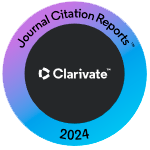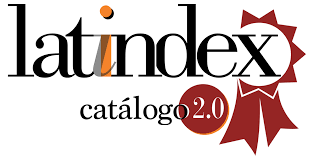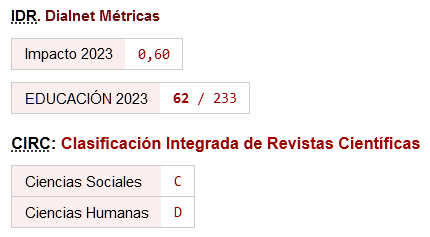Design proposal towards an interdisciplinary approach to environmental education: Theoretical analysis of an innovative practice
DOI:
https://doi.org/10.46661/ijeri.5424Keywords:
Environmental Education, Educational Theory, Landscape, History, teacher trainingAbstract
Environmental protection has become, especially in recent decades, a relevant issue that
concerns people and that is very present in the European and international political agendas.
One of the most useful means of raising awareness of the environment and the fight against
climate change is environmental education. However, this is a specialty not yet specially
defined, which in the educational fields is offered in different ways (as an independent subject,
tangential to others, within science education, etc.). This work aims to defend the need for an
interdisciplinary environmental education that can be presented in any subject. It presents,
through a qualitative and descriptive methodology, the theoretical analysis of innovative
educational practice in the context of secondary education and from the perspective of several
specialties, focused on the description of the passage in the Europe of the Middle Ages. The
result offered is a model of classroom programming, articulated through a didactic monograph
that is the basis of the practice, which is offered as an example for implementing new
proposals for instructional design of environmental education from an interdisciplinary
approach. The presence of environmental problems in any subject and theme offers the best
framework for the awareness processes so necessary today.
Downloads
References
Aarnio-Linnanvuori, E. (2019). How do teachers perceive environmental responsibility? Environmental Education Research, 25(1), 46-61.
Aragunde-Kohl, U., Gómez Galán J., Lázaro Pérez, C., & Martínez López, J. A. (2020). Interaction and emotional connection with pets: A descriptive analysis from Puerto Rico. Animals, 10(11), 2117.
Ardoin, N. M., Bowers, A. W., & Gaillard, E. (2020). Environmental education outcomes for conservation: A systematic review. Biological Conservation, 241, 108224.
Batavia, C., Bruskotter, J. T., & Nelson, M. P. (2020). Pathways from environmental ethics to pro-environmental behaviours? Insights from psychology. Environmental Values, 29(3), 317-337.
Bianchi, R. M. (2007). El Paisaje y el aprendizaje significativo de la historia y las ciencias sociales. Espacio Regional, Revista de Estudios Sociales, 2(4), 21-26.
Breiting, S., & Mogensen, F. (1999). Action competence and environmental education. Cambridge Journal of Education, 29(3), 349-353.
Busto, J. L., García García P., Fernández Cepedal, G., & Vázquez, V. M. (1982). Aula abierta. Cuadernos de Pedagogía, 91, 70-73.
Casas, M. & Erneta, L. (2015). El paisaje en la educación secundaria obligatoria. una oportunidad educativa en el cambio curricular LOE-LOMCE. Didáctica Geográfica, 16, 45-71.
Casas, M. & Puig, J. (2017). El impacto ambiental: una herramienta con un gran potencial para la formación ambiental. Publicaciones Didácticas, 84, 362-371.
Chawla, L. (2015). Benefits of nature contact for children. Journal of Planning Literature, 30(4), 433-452.
Chen, J. C., & Martin, A. R. (2015). Role-play simulations as a transformative methodology in environmental education. Journal of Transformative Education, 13(1), 85-102.
Christenson, M. A. (2004). Teaching multiple perspectives on environmental issues in elementary classrooms: A story of teacher inquiry. Journal of Environmental Education, 35(4), 3-17.
Chrobak, R., Prieto R. M, Prieto, A. B., Gaido, A., & Rotella, A. (2006). Una aproximación a las motivaciones y actitudes del profesorado de enseñanza media de la provincia de Neuquén sobre temas de educación ambiental. Revista Electrónica de Enseñanza de las Ciencias, 5(1), 31-50.
Cid, O. (1992). Equipamientos escolares. Cuadernos de Pedagogía, 204, 18-22.
Colin N. P. (1997). Editorial. A Happy Union: The INISTE Connection. Connect: UNESCO International Bulletin on Scientific and Technical Education and Environmental Education, 23(1), 2.
Cotton, D. (2006). Teaching controversial environmental issues: neutrality and balance in the reality of the classroom. Educational Research, 48(2), 223-241.
Dale, R. G., Powell, R. B., Stern, M. J., & Garst, B. A. (2020). Influence of the natural setting on environmental education outcomes. Environmental Education Research, 26(5), 613-631.
Díez Hochleitner, R. (1993). Medio ambiente, desarrollo sostenible y educación, variables interdependientes. In R. Díez Hochleitner (ed.), Medio Ambiente y Educación (pp. 29-35). Barcelona, Spain: Fundación La Caixa.
Di Norcia, V. (2017). Ecological ethics. Philosophy Now, 122, 48-49.
Dionne, L. (1995). Globalisciences: Recueil d’activités en éducation dans une perspective mondiale. Montreal: Centre de Recherche pour le Développement International (CRDI) y Association des Professeurs de Sciences du Québec.
Driver, R. (1986). Psicología cognoscitiva y esquemas conceptuales de los alumnos. Enseñanza de las Ciencias, 4, 49-53.
Duby, G. (1987). Guerreros y Campesinos. Desarrollo Inicial de la Economía Europea (500-1200). Barcelona, Spain: Siglo XXI.
Elías, M. L. (1987). Un acercamiento al pasado próximo. Cuadernos de Pedagogía, 151, 20-25.
Elliot, J. (1990). La Investigación-Acción en Educación. Madrid, Spain: Morata.
Elvira, P., & Martí, A. (1995). Aula de naturaleza. Cuadernos de Pedagogía, 235, 52-57.
Faure, E. (1976). Aprender a Ser. Madrid, Spain: Alianza Universidad.
Fondation Charles Léopold Mayer pour le Progrès de l’Homme (FPH). (1997). Alliance pour un Monde Responsable et Solidaire. Paris, France: FPH.
Frantz, C. M., & Mayer, F. S. (2014). The importance of connection to nature in assessing environmental education programs. Studies in Educational Evaluation, 41, 85-89.
García de la Vega, A. (2014). Didáctica del paisaje. realidad y reto educativo. Aula Verde, 42, 8-9.
García Ruiz, M. & López Pérez, I. (2005). Las actitudes relacionadas con la ciencia y el ambiente en profesores de Bachillerato de Oaxaca. VII Conference Enseñanza de las Ciencias, México.
Gil, D. (1986). La metodología científica y la enseñanza de las ciencias: unas relaciones controvertidas. Enseñanza de las Ciencias, 4, 111-122.
Glanz, J. (2014). Action Research: An Educational Leader's Guide to School Improvement. Lanham, Maryland, U.S.A.: Rowman & Littlefield.
Global Perspectives in Education (GPD). (1987). Report on the Study Commission on Global Education. New York, NY, U.S.A.: GPD.
Gómez Galán, J. (1998). Educational System Evaluation and Quality. Minneapolis: College of Education and Human Development, University of Minnesota (Reprint, Cupey: UMET, 2015).
Gómez Galán, J. (2001). La Monografía Histórica como Material Curricular en Bachillerato. Badajoz: Fondo de Educación y Promoción CREx.
Gómez Galán, J. (2004). El Paisaje como Contenido Curricular de Educación Ambiental: Una Perspectiva Interdisciplinaria. Madrid: Facultad de Ciencias, Universidad Autónoma de Madrid.
Gómez Galán, J. (2005). Animal rights education: An initiative at university. In N. Jukes, & S. Martinsen (Eds.). Alternatives in the Mainstream: Innovations in Life Science Education and Training. Proceedings of the 2nd InterNICHE Conference, Oslo, Norway, 12–15 May 2005 (pp. 34-43); Leiscester: InterNICHE.
Gómez Galán, J. (2008). Valores medioambientales en la educación. In Premios Nacionales de Investigación Educativa y Tesis Doctorales 2007 (pp. 55-108). Ministerio de Educación: Madrid.
Gómez Galán, J. (2010). Valores Medioambientales en la Educación: Situación del Futuro Profesorado de Extremadura ante la Ecología y el Cambio Climático. Madrid: Ministerio de Educación.
Gómez Galán, J. (2014). La educación en valores medioambientales como base pedagógica de los procesos contemporáneos para el desarrollo sostenible. In J. C. Martínez Coll (ed.). Desarrollo Sostenible y Población. Málaga: Servicios Academicos Internacionales.
Gómez Galán, J. (2015a). Media education as theoretical and practical paradigm for digital literacy: An Interdisciplinary Analysis. European Journal of Science and Theology, 11 (3), 31-44.
Gómez Galán, J. (2015b). Historical and chronological time in education: A new theoretical framework. European Journal of Science and Theology, 11(5), 77-86.
Gómez Galán, J. (2015c). Reestructuración metodológica y curricular de la educación ambiental: Principales líneas de actuación. In J. C. Martínez Coll (ed.). Desarrollo Local en un Mundo Global: Ecoespacios de Centros Urbanos. Málaga: Servicios Academicos Internacionales.
Gómez Galán, J. (2016a). Education against global warming and climate change. En J. Gómez Galán, y A. Serrano (ed.) Climate Change: A Multidisciplinary View. Cupey: UMET Press.
Gómez Galán, J. (2016b). Educación, Protección Animal y Bioética. Cupey: UMET.
Gómez Galán, J. (2017). Nuevos estilos de enseñanza en la era de la convergencia tecno-mediática: Hacia una educación holística e integral. International Journal of Educational Research and Innovation, 8, 60-78.
Gómez Galán, J. (2018a). Enfoque holístico de la educación ambiental: El estudio del paisaje como modelo interdisciplinario. In J. C. Martínez Coll (ed.). Proceedings of I Congreso Online Internacional sobre Economía Social y Desarrollo Local Sostenible (pp. 283-292). Málaga: Universidad de Málaga.
Gómez Galán, J. (2018b). Interdisciplinaridad en Educación Ambiental: Modelos y Desarrollo. Cupey: UMET.
Gómez Galán, J. (2019). Perspectiva social y globalizadora de la educación ambiental: Transformación ética y nuevos retos. Andamios. Revista de Investigación Social, 16, 299–325.
Gómez Galán, J. & Mateos, S. (2002). Versatile spaces for the use of the information technology in education. In N. Mastorakis. Advances in Systems Engineering, Signal Processing and Communications (pp. 351-361). New York: WSEAS Press.
Gómez Galán, J. & Mateos, S. (2003). La enseñanza del tiempo histórico en la educación infantil. In Educación e Historia. Santa Cruz (Bolivia): ABNB.
González Bernaldez, F. (1985). Invitación a la ecología humana. La adaptación efectiva al entorno. Madrid, Spain: Tecnos.
Granit-Dgani, D., Kaplan, A., & Flum, H. (2017). Theory-based assessment in environmental education: A tool for formative evaluation. Environmental Education Research, 23(2), 269-299.
Halstead, J. M. (1996). Values and values education in schools. In J. M. Halstead, & M. J. Taylor (Eds.), Values in Education and Education in Values (pp. 3-14). London, England: Falmer.
Haydon, G. (2004). Values education: Sustaining the ethical environment. Journal of Moral Education, 33, 115-129.
Henderson, J. A., & Zarger, R. K. (2017). Toward political ecologies of environmental education. The Journal of Environmental Education, 48(4), 285-289.
Herman, B. C., Sadler, T. D., Zeidler, D. L., & Newton, M. H. (2018). A socioscientific issues approach to environmental education. In G. Reis & J. Scott (Eds.), International Perspectives on the Theory and Practice of Environmental Education: A Reader (pp. 145-161). Berlin, Germany: Springer.
Higgins, P. (1996). Outdoor education for sustainability: making connections. Journal of Adventure Education and Outdoor Leadership, 13(4), 4-11.
Hopkins, C., Damlamian, J., & Ospina, G. L. (1996). Evolving towards education for sustainable development: an international perspective. Nature and Resources, 32, 2-11.
Hopkinson, P., Hughes, P., & Layer, G. (2008). Sustainable graduates: linking formal, informal and campus curricula to embed education for sustainable development in the student learning experience. Environmental Education Research, 14, 435-454.
Ilesanmi, O. S. (2019). Opinion of environmental education students on teaching methods in higher education: A descriptive research. International Journal of Educational Excellence, 5(2), 65-74.
Jickling, B., & Sterling, S. (2017). Post-Sustainability and Environmental Education: Remaking Education for the Future. Berlin, Germany: Springer.
Jorgenson, S. N., Stephens, J. C., & White, B. (2019). Environmental education in transition: a critical review of recent research on climate change and energy education. The Journal of Environmental Education, 50(3), 160-171.
Khalid, T. (2003). Pre-service high school teachers’ perceptions of three environmental phenomena. Environmental Education Research, 9(1), 35-50.
Knapp, C. E. (1983). A curriculum model for environmental values education. Journal of Environmental Education, 14, 22-26.
Kopnina, H. (2012). Education for Sustainable Development (ESD): The turn away from “environment” in environmental education? Environmental Education Research, 18, 699-717.
Kopnina, H. (2015). Sustainability in Environmental Education: New Strategic Thinking. Environment, Development and Sustainability, 17(5), 987-1002.
Legrand, L. (1982). Pour Collège Démocratique. París: La Documentation Francaise.
Madeluero, J. (2005): El paisaje. Génesis de un concepto. Madrid, Spain: Adaba Editores.
Malet, J. P. (2000). Teacher education for values education, guidance and materials. Journal of Moral Education, 29, 487-489.
Martínez, R., & Arrebola, J. C. (2016). La enseñanza del paisaje en España. Contexto & Educação, 99, 9-33.
Matteson, J. (2013). The virtue of environmental creativity. Environmental Values, 22, 703-723.
Maxwell, B. (2006). Teaching right and wrong: a somewhat irritating expression. Journal of Philosophy of Education, 40, 405-412.
McKenzie, M. (2005). The “post-post period” and environmental education research. Environmental Education Research, 11(4), 401-412.
Mertler, C. A. (2016). Action Research: Improving Schools and Empowering Educators. London, England: Sage.
Minteer, B. A., & Collins, J. P. (2005). Why we need an ecological ethics. Frontiers in Ecology and the Environment, 3(6), 332-337.
MOPTMA (1994). Construyendo el futuro. foro internacional de ong y movimientos sociales. Tratados Alternativos de Río'92. Madrid, Spain: MOPTMA.
Nakagawa, Y., Verlie, B., & Kim, M. (2020). Collectively engaging with theory in environmental education research. Australian Journal of Environmental Education, 36(1), 1-19.
Nieda, J. (1993). El lugar de la educación ambiental. Cuadernos de Pedagogía, 34-39.
Norton, B. G. (2008). Beyond positivist ecology: toward an integrated ecological ethics. Science and Engineering Ethics, 14(4), 581-592.
Novo, M. (1985). Educación ambiental. Madrid: Anaya.
Öhman, J. (2016). New Ethical Challenges within Environmental and Sustainability Education. Environmental Education Research, 22(6), 765-770.
On, L. W. (2004). Values education for citizens in the New Century. Journal of Moral Education, 33, 616-618.
Otto, S., & Pensini, P. (2017). Nature- based environmental education of children: environmental knowledge and connectedness to nature, together, are related to ecological behaviour. Global Environmental Change, 47, 88-94.
Palmer, J. A. (2002). Environmental Education in the 21st Century: Theory, Practice, Progress and Promise. London: Routledge.
Pérez Torras, A. (1992). Currículum y coherencia ambiental. Cuadernos de Pedagogía, 204, 14-16.
Pooley, J. A., & O’Connor, M. (2000). Environmental education and attitudes. emotions and beliefs are what is needed. Environmental and Behavior, 32(5), 711-723.
Porlán, R., & Rivero, A. (1994). Investigación del medio y conocimiento escolar. Cuadernos de Pedagogía, 227, 28-31.
Projet des Universités Francophones de l’Est du Canada (1995). L’Éducation dans une Perspective Planétaire: Une Passerelle vers l’Avenir. Montréal: Université de Montréal.
Riechmann, J. (2004). Ética ecológica: propuestas para una reorientación. Barcelona, Spain: Icaria Editorial.
Ross, N. (2020). Anthropocentric tendencies in environmental education: a critical discourse analysis of nature-based learning. Ethics and Education, 15(3), 355-370.
Ruiz Sanz, J. P. (1989). Ecología y cultura en la ganadería de montaña. Madrid, Spain: Ministerio de Agricultura.
Saari, M. H., & Gómez-Galán, J. (2018). Humane education as a new didactic for animal protection: Education as a driving force for social justice. In A. Linzey (Ed.). The Fifth Annual Oxford Animal Ethics Summer School Animal Ethics and Law: Creating Positive Change for Animals (pp. 1-9); Oxford: Centre for Animal Ethics, University of Oxford.
Saari, M. H., & Gómez-Galán, J. (2019). Innovative educational models for nonhuman animal protection: A case study on a European school scheme. International Journal of Educational Excellence, 5(1), 95-114.
Sauvé, L. (1999). La Educación ambiental entre la modernidad y la posmodernidad: en busca de un marco de referencia educativo integrador. Tópicos en Educación Ambiental, 1(2), 7-25.
Sauvé, L. (2005). Currents in environmental education: mapping a complex and evolving pedagogical field. Canadian Journal of Environmental Education, 10, 11-37.
Scott, W., & Oulton, C. (1998). Environmental values education: an exploration of its role in the school curriculum. Journal of Moral Education, 27, 209-224.
Silcock, P., & Duncan, D. (2001). Values acquisition and values education: Some proposals. British Journal of Educational Studies, 49, 242-259.
Sireau, A. (1989). Educación y medio ambiente. Madrid: UNESCO y OEI/Popular.
Sosa, N. M. (1990). Ética ecológica. Madrid: Ediciones Libertarias.
Tillmanns, T. (2020). Learning sustainability as an effect of disruption. Environmental Education Research, 26(1), 14-26.
Thompson, P. B. (2008). Agrarian philosophy and ecological ethics. Science and Engineering Ethics, 14(4), 527.
UNESCO (1980). Environmental Education in the Light of the Tbilisi Conference. (Versión en español: La Educación Ambiental. Las Grandes Orientaciones de la Conferencia de Tbilisi. Paris, France: UNESCO.
UNESCO (1997). Éduquer pour un avenir viable: Une vision transdisciplinaire pour l’action concertée. International Conference on Environment and Society. Thessaloniki: UNESCO.
Van Poeck, K., & Lysgaard, J. A. (2016). The roots and routes of environmental and sustainability education policy research. Environmental Education Research, 22(3), 305-318.
Wals, A. E., Brody, M., Dillon, J., & Stevenson, R. B. (2014). Convergence between Science and Environmental Education. Science, 344(6184), 583-584.
Wals, A., Weakland, J., & Corcoran, P. B (2017). Preparing for the Ecocene: Envisioning futures for environmental and sustainability education. Japanese Journal of Environmental Education, 26(4), 71-76.
Washington, H., & Maloney, M. (2020). The need for ecological ethics in a new ecological economics. Ecological Economics, 169, 106478.
Downloads
Published
How to Cite
Issue
Section
License
Copyright (c) 2021 José Gómez Galán, Olga Figueroa Miranda, Cristina Lázaro Pérez, Martínez López Jo´sé Ángel

This work is licensed under a Creative Commons Attribution-NonCommercial-NoDerivatives 4.0 International License.












